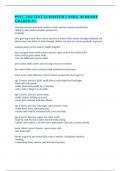PSYC 2314 TEST 3 CHAPTER 5 AND 6 ALREADY
GRADED A+.
what sets humans apart from animals correct answers -human socialization,
-ability to take another person's perspective,
-language
slow growing frontal lobes correct answers as frontal lobes mature through childhood and
adolescence, our ability to think through, inhibit, and plan our actions gradually improves.
cephalocaudal correct answers bodies lengthen
boys and girls motor skills correct answers -girls excel at fine motor skills,
-boys excel at gross motor skills,
-true, the difference may be small.
gross motor skills correct answers large muscle movement
fine motor skills correct answers small coordinated movement,
select motor skills milestone correct answers progression from age 2-6
age 2 correct answers -picks small objects with thumb and forefinger,
-feeds self with spoon,
-walks unassisted,usually by 12 months,
-rolls a ball or flings it awkwardly.
age 5 correct answers -prints name,
-walks without holding on to rail,
-tosses ball overhand with bent elbows.
age 4 correct answers -cuts paper, approximates circle,
-walks down stairs, alternating feet,
-catches and controls a bounced ball across the body.
age 6 correct answers -copies two short words,
-hops on each foot for 1 meter but still holds railing,
-catches and controls a 10 inch ball in both hands with arms in front of body.
motor talents correct answers -gross motor skill,
-fine motor skill
threats to growth and motor skills correct answers -inadequate nutrition,
-stunting,
-compromise bone, muscle, and brain development,
, -causes lethargy,
-impairs gross and fine motor skills.
obesity correct answers -lack of physical activity, (primary culprit)
-oversize portions of foods, cheaper foods, high in calorie (fast foods)
-negative attitude toward the obese
preoperational stage correct answers span ages 2 to 7
preoperational thinking characteristics correct answers -child can't think conceptually,
-child can't reason logically,
-child cannot look beyond appearance,
-young children understand only what they can see
piaget's conservation tasks correct answers -preoperational children don't understand
conservation
conservation correct answers knowing the the amount of substance remains the same despite the
changes in the shape of form
preoperational children don't understand correct answers -the laws of conservation,
-the concept of reversibility,
-children center only on watch they can see
class inclusion correct answers the understanding that a general category can encompass several
subordinate elements
seriation correct answers the ability to put things in order
perceptions about people correct answers children have an ability to grasp "identity constance"
animism correct answers the believe that that inanimate objects are alive
artificialism correct answers the believe that humans make everything in nature
egocentrism,
(Piagets theory) correct answers the ability to understand another's perspective,
children think that everyone knows what is in his head, they are too little to lie
Piaget's concrete operation stage, 8 to 11 correct answers transition from pre operations to
concrete operations, develops gradually between age 5 to 7, but is firmly by 8
concrete operation correct answers children understand:
-conservation tasks,
-identity constance,
-look beyond immediate appearances,




